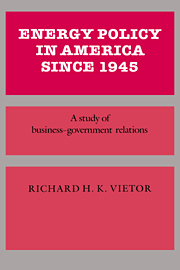Book contents
- Frontmatter
- Contents
- List of charts and figures
- List of tables
- Editors' preface
- Acknowledgments
- List of abbreviations
- 1 Introduction: The political economy of energy
- Part I The transition to peace and fluid fuels, 1945–1958
- Part II Managing surplus through the politics of stasis, 1959–1968
- 6 Oil import quotas
- 7 Formula for shortage: natural gas price controls
- 8 Synfuels revisited: nostrum for the coal industry
- Part III The second energy transition: adjustment to depletion, 1969–1980
- Index
6 - Oil import quotas
Published online by Cambridge University Press: 13 October 2009
- Frontmatter
- Contents
- List of charts and figures
- List of tables
- Editors' preface
- Acknowledgments
- List of abbreviations
- 1 Introduction: The political economy of energy
- Part I The transition to peace and fluid fuels, 1945–1958
- Part II Managing surplus through the politics of stasis, 1959–1968
- 6 Oil import quotas
- 7 Formula for shortage: natural gas price controls
- 8 Synfuels revisited: nostrum for the coal industry
- Part III The second energy transition: adjustment to depletion, 1969–1980
- Index
Summary
Few other regulatory schemes in America's history can match the Mandatory Oil Import Program for labyrinthine complexity, or for the distortion of markets and interest-group dissension that it caused. While managers and bureaucrats were preoccupied with the tactical politics of allocating the surplus, it simply slipped away.
This chapter examines political relationships in this major regulatory program. It is not a story of a simple bilateral relations between agency and industry. Oil import regulations were determined by a host of multilateral frictions: among sectors of the industry and individual firms, between them and the Oil Import Administration (the agency that ran the program), and among various cabinet departments and congressional interest-groups that cared about the program's policies. Intrafuel and intra-governmental politics commingled to create detailed rules that affected not just the financial, logistical, and operating decisions of the companies, but in many instances, their basic corporate strategies. Each rule seemed to precipitate a score of side effects and political repercussions which, like a tar baby, resulted in a longer, more complicated chain of regulations as time went on.
From 1959 to 1973, the Mandatory Oil Import Program evolved through three phases of policy controversy. Start-up problems, and their distributional impact on different sectors of the oil industry, dominated the first phase through 1964. The focus of political conflict shifted in 1965 to quota exemptions for individual firms and the program's unanticipated effects.
- Type
- Chapter
- Information
- Energy Policy in America since 1945A Study of Business-Government Relations, pp. 119 - 145Publisher: Cambridge University PressPrint publication year: 1984



